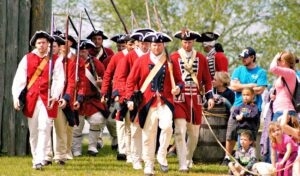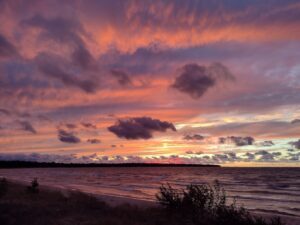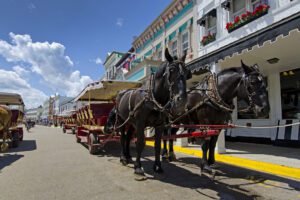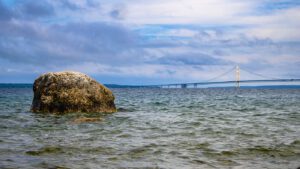Photo by the Mackinaw Area Visitors Bureau
Whether it is spelled Mackinaw as in Mackinaw City or Mackinac as in Mackinac Island, they are pronounced the same way: Mack-i-naw. Why? It is because of the area’s rich history with the Native Americans, French, and British.
The area was named Michilimackinac by the Native Americans and when the French built a fort here in 1715, they recorded the name with a “c” on the end as a French word with an “aw” sound would be pronounced. Many guests to the area mispronounce Mackinac by saying “Mack-i-nack.” The “c” on the end of this word is instead pronounced as “aw.”
The word became shortened to Mackinac. The fort was moved on the winter ice to the island across the straits which became known as Mackinac Island.
Edgar Conkling was the founder of the city in 1857 and he changed the name to Mackinaw to reflect how the word actually sounds. Thus, in this part of Michigan, there is Mackinac Island, the Mackinac Bridge, the Straits of Mackinac, Mackinaw City, and the Icebreaker Mackinaw and they are all pronounced the same way: Mack-i-naw. There is no Nack in Mackinaw or “aw”! Pronounce it Mack-i-knack and you’ll give yourself away as a tourist who doesn’t know how to pronounce the place that you’re visiting…..

The arts, history and many types of entertainment in Northern Michigan mean visitors can enjoy fabulous music, theatre, and culture.

The history of the fur trade in Northern Michigan is captured at Colonial Michilimackinac in Mackinaw City.

Wilderness State Park’s 2,582 acres of natural area and 4,492 acres of wilderness area make this a great place to explore all year ’round.

With woods, dunes, and frozen lakes, the trails near Charlevoix and Boyne City are the places to cross country ski from December-March.

Get off the ferry from Mackinaw City or St. Ignace to Mackinac Island and the first thing you’ll see is the historic downtown area.

McGulpin Rock, near Mackinaw City, has been used as a navigational tool by explorers and mariners since before the Pilgrims landed.